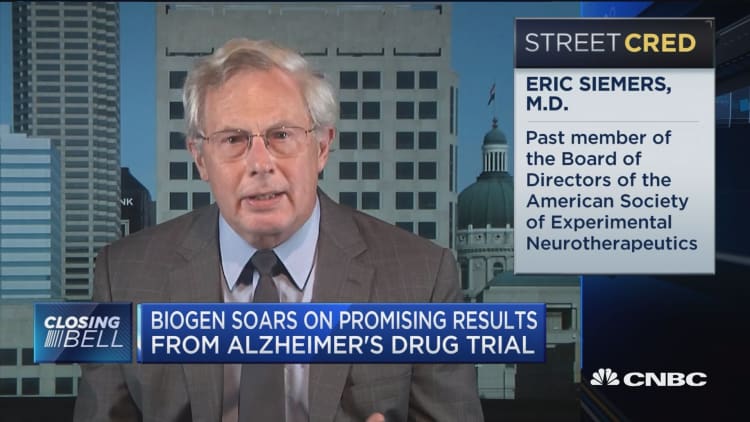
The clinical trial for an Alzheimer’s treatment from drugmakers Biogen and Eisai was “extremely encouraging” — but more still needs to be done, Biogen Chairman Stelios Papadopoulos told CNBC on Friday.
The companies announced positive results on Thursday from a Phase II study with BAN2401, an anti-amyloid beta protofibril antibody, in 856 patients with early Alzheimer's disease.
The trial demonstrated for the first time that there is an antibody that can clear plaque in the brain, Papadopoulos said on “Closing Bell.”
“More importantly, what this trial showed is that the clearance of plaque was associated with a slowdown of the cognitive decline,” he added, noting it is the first time a rigorous trial has shown that.
However, he pointed out, “It’s not as if we improved the condition or we stabilized even the cognitive decline. We’ve slowed down the cognitive decline.”
“It’s an extremely encouraging first step but it’s only a first step. We need to do a lot more,” said Papadopoulos.
It may also be a while before any approved treatment ultimately reaches patients. Papadopoulos said the best-case scenario would be two to three years from now. As for costs – he said it was “way too premature” to speculate on a potential price tag.
Biogen shares soared Friday on the positive study results, closing nearly 20 percent higher.
The Mayo Clinic’s Ronald Petersen, who directs the Mayo Clinic Alzheimer’s Disease Research Center, called the results “early but encouraging”
“I’m cautiously optimistic,” he said on “Power Lunch.”
BAN2401 is one of a number of drugs targeting beta amyloid, a protein that forms toxic brain plaques that are theoretically an underlying cause of the memory-robbing disease.
There is still no treatment that can slow the progression of Alzheimer’s, the commonest form of dementia. Current drugs can do no more than ease some of the symptoms.

If this latest treatment is ultimately successful, it would be “major step forward,” Petersen said.
“Cure is probably an overrated goal for Alzheimer’s disease but if we could delay the onset of the symptoms, slow the progression of the disease that would be huge for patients,” he added.
However, Petersen noted that right now only top-line results from the study have been released. Biogen and Eisai are expected to release the detailed results of the final analysis of the midstage trial at future conferences.
BAN2401 is one of two Alzheimer’s treatments Biogen and Eisai are pursuing. They are also developing a drug called aducanumab.
“They each have different ways of treating the disease. For now we intend to continue with both until we see exactly how they work,” Papadopoulos said.
Currently, 5.7 million Americans are living with Alzheimer's and that number is expected to rise, according to the Alzheimer's Association. By 2050, it's projected to reach nearly 14 million people in the U.S.
— CNBC's Tae Kim and Reuters contributed to this report.


